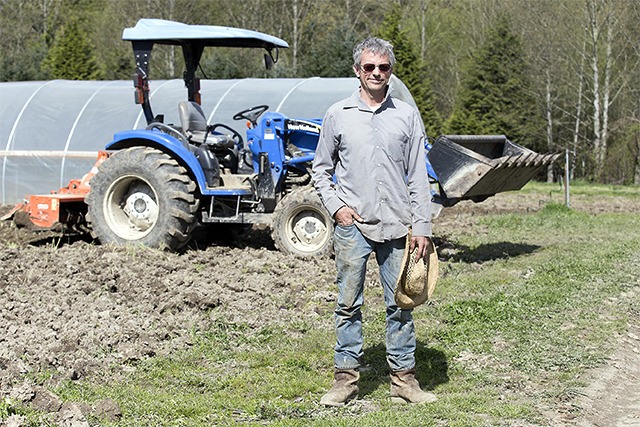What does Northwest rock’n’roll darling Jimi Hendrix have in common with farming?
The Experience Farming Project is a hands-on program offered through Sno-Valley Tilth to allow future farmers to learn and experiment with farming without the daunting start-up costs. It draws its inspiration from an unlikely source: The Experience Music Project in Seattle.
“It’s almost similar to what you have when you go to the (EMP’s Sound Lab),” Sean Stratman, Experience Farming Project manager, explained from a rickety lawn-chair on the 15-acre property in Carnation. “They don’t teach you how to be a musician, you just show up and they give you the tools.”
Instead of electric guitars and Hendrix’s groovy, floral shirts, the Experience Farming Project gives farmers access to up to two acres of cover cropped and tilled land, irrigation, a wash station, covered dry storage, an on-site tractor they can hire by the hour and an information-knowledge exchange network.
As a prerequisite, program participants must have college-level training in agricultural endeavors, farming experience or large-garden market experience.
The program garners no profit for Sno-Valley Tilth and, as of 2015, charges $500 for a half acre, $250 for a quarter acre and $125 for an eighth of an acre. The fee covers land rental, cover cropping, initial tilling and an additional hour of tractor assistance work later in the season.
“It’s a little bit different from your standard incubator (farm), or style of organization,” Stratman continued. “What we’re really concentrating on is giving people who have farming experience the resources they need for starting their own business.”
Stratman runs Dancing Crow Farms alongside seven other “farms” on the project property, which is a part of Stuart Landing. In its past life, Stuart Landing was host to a milk farm but the land was left fallow for decades.
“It was hard to imagine when we bought it that it would ever be useful,” stated Claire Foster, property owner and Sno-Valley Tilth board member. Foster said she and her husband purchased the land in 2002 for hunting purposes, but spent the last seven years mowing down the Canadian thistle, bindweed and blackberry bushes.
Stratman said the Tilth partnership developed organically over the last five years, as he and Foster allowed farmers to work on the land in exchange for maintaining the property.
“We had a constant interest from people who had farming experience and needed places to farm,” he continued. “Light bulbs went off in a few of our heads and we were like, ‘Oh, wow we’re already kind of doing this. Why don’t we use the resources of the non-profit and actually make this program official?’
“It’s a beautiful dynamic that unfolded, the way this whole program has evolved. There are resources abounding and it’s just figuring out who can use those resources at the right time to make great things happen.”
Stratman said he envisions the project turning into an “information or knowledge exchange network” rather than a mentoring program, while Foster said she wants to see, “more farmers on more farmland, growing food for our community.”
Regardless, both agree that locally grown produce is the best method for accessing fresh quality produce, efficiency and production accountability.

Outside Carnation, farmer Ian Fels plants carrot seeds on his plot of land while Sean Stratman tills a plot in the background.
One of the budding farmers is Ian Fels, a Seattle commuter who runs Mezza Luna Farms in Stuart Landing. When we spoke, Fels was painstakingly pacing down one of his four rows of future carrot plants, pushing a machine that’s designed to deposit small seeds.
“I come from a family that farms, but I got away from it for a long time. I got laid off about seven or eight years ago,” Fels explained, saying the snowboard company he worked for relocated to California.
“I could say I was a little upset, I didn’t have a job. My wife came home one day and I was gardening and she goes, ‘You’re the happiest when you do that.’ The idea of farming came from there… I talked to my dad and he (said), ‘We were wondering when you’d come back.’”
Fels said he and his wife studied “Cultivation Success” through a program at Washington State University, and his past farming experience includes working for the Herbfarm restaurant at their 5-acre farm, which supplies the restaurant. She now works as a project manager for software development in Seattle, which he said is a huge support for his budding business.
“I’m kind of an anomaly, and I also have the most land (on site),” Fels stated about his acre and a half of land. He’s built his farm on this land in 2012, two years before the program even started.
As a Carnation farming veteran, he said he’s seen the program grow in terms of road improvements and the “promise of things to come,” like a new water source.
“If you’re a small farmer, you can make it work,” he said. “It’s hard, but that’s why the program’s good. It gives people a chance to get on the dirt.”
Foster said the program has room for growth, but with recent thefts of tents and other equipment from the Tilth-run Carnation Farmers Market, expansion isn’t likely happening any time soon.
“We operate on a shoestring budget,” she said, which makes replacing a $500 tent is a huge burden. “This hits us pretty hard.”
Despite the setback, Tilth’s spirit is far from broken. The group will continue with its fifth annual auction May 31, along with community potlucks and the annual Carnation farmers market, which opens May 5, and runs through October — but resiliency is what Tilth and the project are about.
“There’s just a lot of hurdles that beginning farm owners have to jump…. What we’re trying to do with this program is knock down some of those hurdles,” Stratman said, and that might just be one missing tent at a time.

